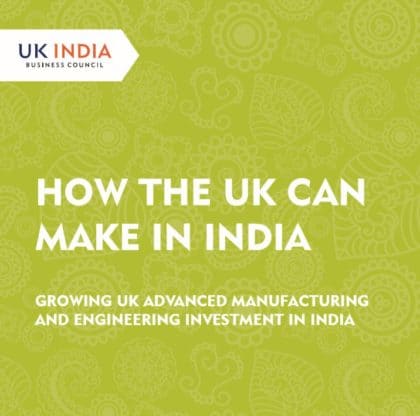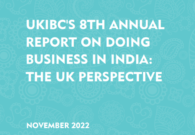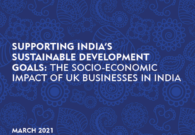How the UK can Make in India – Growing UK Advanced manufacturing and Engineering Investment in India

This report, grounded in extensive consultations with our members, makes the case for how the business and operating environment in India can be improved to meaningfully grow UK manufacturing investment and jobs.
India is expected to become the fifth largest manufacturing country in the world by the end of 2020 with advanced manufacturing and engineering forming a central pillar in the Government of India’s economic vision.
Keynote initiative ‘Make in India’ aims to make India a high-value and efficient global manufacturing hub where Manufacturing generates 100 million jobs and 25% of India’s GDP by 2022, up from 16% currently.
This is already bearing fruit with global giants including Perkins Engines, Rolls-Royce, JCB, BAE Systems, and Renishaw all setting up manufacturing plants in India, attracted by growing skills, an expanding market, and the growing potential of India as an exporting hub.
For Make in India to be a full success however, it will require a significant gear-change in India’s economy. It will not be enough for India’s manufacturing sector to grow with the economy – it must drive the economy.
In helping to achieve this, the UK stands to be an important and strategic partner. The UK’s expertise closely aligns and compliments India’s manufacturing and engineering ambition to develop a clear comparative advantage in high-value, efficient production.
A strong start-up culture around distinct tech clusters, active venture capital, world-leading universities, the lowest corporation tax in the G20, and notable strengths in electronic systems, communications, data management and analytics, cloud services, AI, cyber security, and sensors make the UK a high-value strategic partner on the international manufacturing stage.
UK and Indian businesses want to transfer knowledge, collaborate, and partner, particularly in realising industry 4.0. However, this is not without barriers.
This is why, in our report, we make nine high-impact recommendations, these include:
- Strengthening international partnerships in defence manufacturing
- Expanding FDI in defence
- Fast, efficient, and transparent customs approvals
- Globally competitive taxation
- Consistent implementation and enforcement of policy
- Strengthening IP enforcement
- Strategic support for digital manufacturing
- Re-classifying India as “low-risk” to boost labour mobility
- Increased Government-to-Government interactions
If implemented, these recommendations would transform FDI into India and further improve the UK-India partnership, not least in defence and aerospace.
UKIBC CEO, Richard Heald, said:
“India’s ambition to become a 21st century manufacturing superpower is absolutely right. However, in order to achieve this, international partners and collaboration will be absolutely crucial. As such, we very much look forward to working closely with the Government of India, and strategically important State-level Governments, to explore how the recommendations of industry made in our report can be implemented to the greatest effect”
In drafting this report, UKIBC consulted closely with the largest manufacturing and engineering firms across the UK-India corridor through a series of dedicated events, surveys, and one-to-one interactions. If you would like to find out more about work in the advanced manufacturing sector and how to become involved, please get in touch with our Sector Manager, Prasenjit Dhar at prasenjit.dhar@ukibc.com







